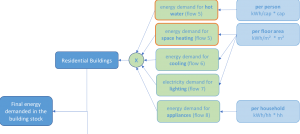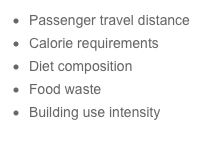Lifestyles
Work Package lead: Potsdam Institute for Climate Impact Research (PIK)
Module design
Description of the module design

The module design is described specifying interactions with other sectors or modules.
Data & Assumptions
Lifestyles data

Overview of the data collected, gathered and presented. Metadata is also provided.
Implementation
Timeline, KNIME flow and progress documentation

A timeline and a flow visualization of the programmed module have been created to show progress and compare implementation to the module design
Your feedback and comments are much appreciated, questions will be addressed rapidly.
Module design
The objectives of WP1 are threefold, 1) to supply the European Calculator model with plausible lifestyle metrics shaping energy demand across the building, transport and food modules, 2) to provide downscaled climatic scenarios for Europe to be used in particular modules (e.g., building, electricity), and 3) systematically evaluate future technological development in the European Union.
Regarding lifestyles, WP makes use of statistical analysis linking socio-economic and individual drivers (e.g., income, age, travel time) with concrete metrics such as calorie consumption or travel distance, in order to determine plausible ranges of demand levers.
Data & Assumptions
Levers
Data used in WP1 comes from a variety of sources. Lifestyle levers are determined using socio-economic data from Eurostat, European research projects, national statistical agencies and specialised literature. Lifestyle levers evaluated are:
- Passenger travel distance
- Calorie requirements
- Diet composition
- Food waste
- Building use intensity
Implementation
Timeline
The Lifestyles work-package timeline is summarised in the figure below and highlights key milestones and expected outcomes.

Contact point
For questions about the Lifestyles data and module, please contact: Luis Costa, carvalho|at|pik-potsdam.de, 0049 331-288-2527
